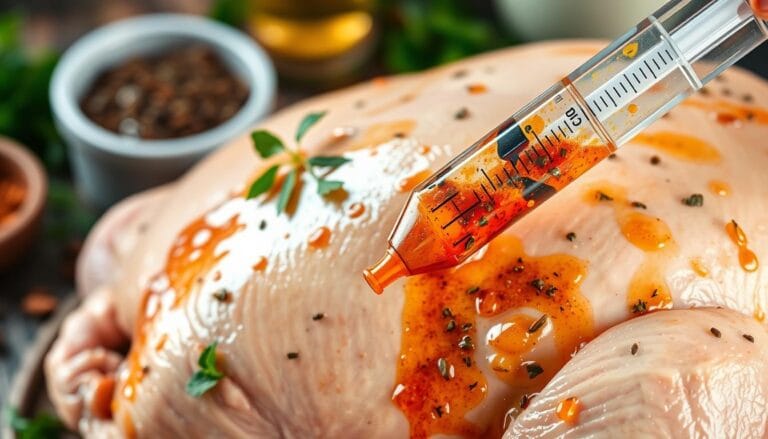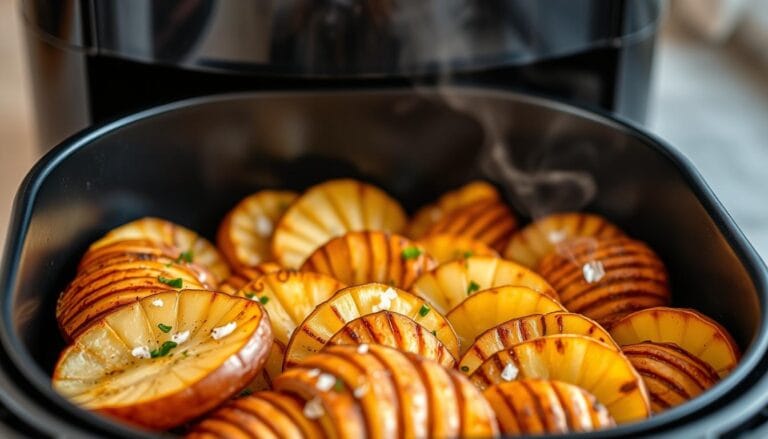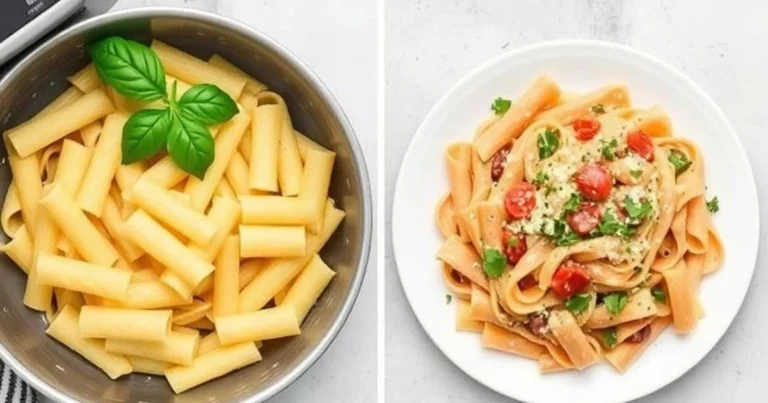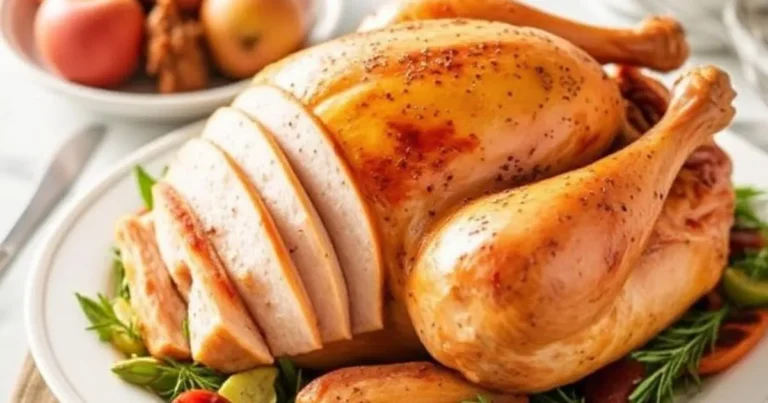Step-by-Step Guide: What to Inject into Turkey for Maximum Flavor
Every Thanksgiving, I’ve watched my grandmother turn an ordinary turkey into a masterpiece. She uses a secret injection technique. The moment she pulled out her injector, I knew something magical was about to happen.

Injecting a turkey is more than just cooking—it’s an art that makes your holiday meal unforgettable. Whether you’re making a marinade injection for a family gathering or trying turkey brine injection techniques, this guide will show you how to make the most delicious turkey ever.
Both professional chefs and home cooks have found that injecting turkey can make even the driest bird taste amazing. Our guide will teach you everything you need to know about this game-changing cooking technique.
Key Takeaways
- Injection techniques dramatically improve turkey moisture and flavor
- Different injection methods work for various cooking styles
- Proper technique prevents dry, bland turkey meat
- Marinade and brine injections offer versatile flavor options
- Professional chefs rely on precise injection methods
Understanding Turkey Injection: The Ultimate Flavor Enhancement Method
Cooking the perfect turkey is more than just seasoning. A meat injector brings deep flavor that marinating can’t match. Both pros and home cooks are finding the poultry brine injection technique game-changing.
Discovering flavor injection’s secrets reveals its unique benefits. Let’s see how a flavor injector can turn your turkey into a masterpiece.
Benefits of Injection Over Traditional Marinating
- Deeper flavor penetration into meat fibers
- Faster seasoning process
- More uniform flavor distribution
- Reduced risk of surface-level seasoning
How Injection Affects Meat Texture
Flavor injection does more than add taste—it changes texture. It keeps turkey meat moist and tender. This avoids the dry, tough turkey often seen in traditional cooking.
Science Behind Flavor Distribution
| Injection Method | Flavor Penetration Depth | Moisture Retention |
|---|---|---|
| Traditional Marinating | Surface Level | Low |
| Flavor Injector Technique | Deep Muscle Tissue | High |
“Injection is not just a technique, it’s a culinary art that transforms ordinary poultry into an extraordinary dining experience.” – Professional Chef
By grasping these principles, you can make restaurant-quality turkey at home. The secret is in precision, technique, and the right tools.
Essential Equipment for Turkey Injection Success
Choosing the right flavor injector is crucial for your turkey. Professional chefs say a good meat injector turns a simple turkey into a work of art.
- Needle size and durability
- Material composition
- Ease of cleaning
- Comfort and grip design
There are many types of flavor injectors for different needs. You can find everything from simple plastic ones to top-notch stainless steel ones. Your choice depends on how often you cook and your skill level.
| Injector Type | Price Range | Best For |
|---|---|---|
| Plastic Injector | $10-$25 | Casual home cooks |
| Stainless Steel Injector | $30-$75 | Professional chefs, frequent use |
| Commercial Grade Injector | $75-$150 | Catering, competition BBQ |
“A great flavor injector is like a painter’s brush—it transforms your ingredient into a masterpiece.” – Culinary Expert
Tools that go well with your meat injector include:
- Large mixing bowls for preparing injection marinades
- Refrigerator-safe containers
- Cleaning brushes specific to injector maintenance
Pro tip: Always choose a flavor injector with multiple needle sizes to accommodate different meat types and desired flavor penetration.
The Perfect Time to Inject into Turkey Before Cooking
Timing is everything when you prepare to inject into turkey. Getting the right moment for turkey moisture injection can make your holiday centerpiece amazing. It’s all about maximizing flavor and ensuring the meat is perfectly prepared.
Temperature Sweet Spot for Injection
The best temperature for turkey moisture injection is between 34-40°F. Cold meat absorbs marinades better and prevents bacteria growth. Before injecting, make sure your turkey is:
- Completely thawed
- Chilled but not frozen
- Pat dried with paper towels
Strategic Injection Scheduling
Your turkey injection timeline is important. Follow these guidelines:
- Inject 12-24 hours before cooking
- Store injected turkey in refrigerator
- Cover loosely with plastic wrap
- Keep away from other food items
Safe Storage Practices
Proper storage after turkey moisture injection is crucial for food safety. Always refrigerate your injected turkey right away. Use a dedicated container or sealed plastic bag to prevent cross-contamination. Store the turkey on the bottom shelf of your fridge to avoid drips on other foods.
“Precision in timing and temperature can elevate your turkey from good to gourmet.” – Professional Chef Recommendation
Best Injection Locations for Even Flavor Distribution
Mastering flavor infusion means knowing the best spots to inject your turkey. Precision is key, not how much you inject. The right spots can turn a simple turkey into a feast.
Professional chefs say to focus on these key areas for the best flavor:
- Breast meat: The main spot for injecting flavor
- Thigh regions: These areas tend to dry out and need extra moisture
- Under the skin: This lets flavors spread evenly
- Near bone joints: This ensures flavors reach deep into the meat
Your strategy should target areas that dry out during cooking. The breast absorbs flavors well, making it a key spot. By injecting in several places, you ensure even flavor.
“The secret to a perfect turkey is not just what you inject, but where you inject.” – Culinary Experts
Here are some expert tips for injecting:
- Insert the needle at a 45-degree angle
- Use slow, steady movements
- Space injections about 1-2 inches apart
- Avoid over-saturating any single area
By choosing the right spots for injection, your turkey will be juicy, full of flavor, and unforgettable.
Classic Butter and Herb Injection Recipe
Learning to make a marinade injection can turn a simple turkey into a feast. This recipe uses butter and herbs to add depth to your turkey. It’s a simple yet elegant way to make your turkey taste amazing.
To make a great turkey injection, you need to know about flavor balance. Mixing melted butter with herbs creates a marinade that goes deep into the meat. This makes every bite full of flavor.
Ingredient Measurements
- 1/2 cup unsalted butter, melted
- 2 tablespoons fresh chopped herbs (rosemary, thyme, sage)
- 2 cloves garlic, minced
- 1 teaspoon kosher salt
- 1/2 teaspoon black pepper
- 1/4 cup chicken broth
Preparation Steps
- Melt butter in a small saucepan over low heat
- Finely chop fresh herbs and mince garlic
- Mix all ingredients thoroughly
- Let mixture cool for 5 minutes before injection
- Use a meat injector to distribute evenly throughout the turkey
Storage Instructions
Keep your herb-infused marinade in an airtight container in the fridge for up to 24 hours. Always make the injection fresh for the best taste.
“The secret to a perfect turkey is not just in the cooking, but in the preparation of the marinade injection.” – Professional Chef
Pro tip: Warm the turkey a bit before injecting. This helps the butter marinade go deeper into the meat. It makes your turkey juicier and more flavorful.
Savory Broth-Based Injection Solutions
Boosting your turkey’s taste starts with clever turkey brine injection methods. Broth-based solutions are a great way to turn a simple dish into a feast. The trick is to pick the right liquid base and add special ingredients.

- Chicken stock – a classic and versatile choice
- Vegetable broth – for a lighter, herbaceous taste
- Mushroom stock – adds a deep, earthy flavor
- Bone broth – rich in nutrients and intense taste
To make the perfect broth-based injection, balance salt and aromas. Begin with a good, low-sodium broth. Then, try these flavor boosters:
- Fresh herbs (rosemary, thyme, sage)
- Garlic and shallot infusions
- White wine reduction
- Smoky spice blends
“The key to an exceptional turkey is not just what you inject, but how you craft your injection solution.” – Professional Chef Recommendation
Pro tip for turkey brine injection: Always strain your broth to avoid clogging the needle. Chill the solution before injecting to help it soak into the meat better.
Citrus and Spice Injection Combinations
To make your turkey taste amazing, you need the right marinade injection. Using citrus and spices can turn a simple turkey into a feast. The mix of zesty fruits and spices will make your guests go wild.
Creating the perfect spice injection is all about mixing citrus fruits with spices. You want a blend that boosts the turkey’s flavor without being too much.
Citrus Blend Ratios for Maximum Flavor
- Lemon: Provides sharp, bright notes (30% of citrus blend)
- Orange: Adds sweet undertones (40% of citrus blend)
- Lime: Brings tangy complexity (30% of citrus blend)
Complementary Spice Selection
| Citrus Type | Recommended Spices | Flavor Profile |
|---|---|---|
| Lemon | Rosemary, Thyme | Herbal and Bright |
| Orange | Paprika, Cinnamon | Warm and Sweet |
| Lime | Cumin, Chili Powder | Spicy and Zesty |
When making your spice injection, be precise. Use a meat injector to spread the marinade evenly. Start with a little and add more to avoid too much flavor.
Pro tip: Always strain your marinade injection mixture to prevent clogging in your injector and ensure smooth application.
Trying out different citrus and spice mixes can make your turkey stand out. The secret is finding the right balance and knowing how flavors work together.
Common Turkey Injection Mistakes to Avoid
Learning to inject turkey well takes skill and knowledge. Many home cooks make mistakes that can ruin the taste and texture of their turkey. Knowing these common errors will help you make a perfectly seasoned turkey.
- Over-Injection Problem: Too much liquid can make the meat taste uneven and feel soggy. Try for moderate, consistent injections all over the turkey.
- Needle Selection Errors: The wrong needle size can harm the meat or stop the liquid from spreading right. Pick a needle with multiple side holes for even distribution.
- Temperature Mistakes: Injecting cold marinade into cold meat doesn’t absorb well. Make sure both the marinade and turkey are at room temperature before you start.
Experts say to inject turkey in a certain way. Start with the breast, then do the thighs and legs. Always inject straight into the muscle fibers for the best flavor.
“The secret is not just in what you inject, but how you inject it.” – Professional Chef Recommendation
Making mistakes can turn your turkey from a great dish to a bad one. Focus on your technique, ingredients, and how you inject to get amazing results.
- Keep your injection tools clean to avoid contamination
- Use fresh, quality ingredients for your mix
- Be patient and precise when injecting
By knowing and avoiding these common mistakes, you’ll improve your cooking and wow your guests with a juicy, perfectly seasoned turkey.
Troubleshooting Injection Problems
Using a flavor injector or meat injector can sometimes lead to issues. These problems can mess up your turkey prep. Knowing how to fix these issues will help you get the flavor right every time.

Common Challenges with Meat Injectors
Getting your turkey just right needs skill with your flavor injector. Some common problems can stop you from getting the flavor right.
- Clogged needle openings
- Uneven liquid distribution
- Unexpected liquid leakage
- Inconsistent injection patterns
Solving Clogged Injector Problems
A clogged meat injector can ruin your cooking plans. Here are some tips to avoid clogs:
- Strain your injection liquid through a fine-mesh strainer
- Remove any herb chunks or large particles
- Warm liquids slightly to improve flow
- Clean your flavor injector immediately after use
“A clean injector is a reliable injector” – Professional Chef Recommendation
Preventing Liquid Leakage
Liquid leakage can make your turkey unevenly flavored. Here are ways to keep the seal tight and injection perfect:
| Problem | Solution |
|---|---|
| Loose Needle | Tighten connections before injection |
| Damaged Seals | Replace injector seals regularly |
| Overfilling | Inject slowly and in controlled amounts |
Pro tip: Always test your flavor injector’s seal before starting the full injection process to prevent unexpected mess.
Safety Guidelines and Food Handling Tips
When you’re working with turkey brine injection, keeping food safe is key. Raw poultry can be risky, so you need to handle it carefully. Knowing the right safety steps can help avoid foodborne illnesses and make sure your meal is both tasty and safe.
Here are some critical safety steps for making poultry brine:
- Wash your hands well with soap and warm water before and after touching raw turkey.
- Use a different cutting board for raw poultry.
- Clean all injection tools right after you use them.
- Keep everything cold, below 40°F.
“Proper food handling isn’t just a recommendation—it’s a necessity for protecting your family’s health.” – Food Safety Experts
Your turkey brine injection needs careful attention to temperature. Keep cold ingredients like butter or broth chilled to stop bacteria from growing. Always put the injected turkey in the fridge right away and use it within 24 hours for the best safety.
| Safety Aspect | Recommended Action |
|---|---|
| Hand Washing | 20 seconds with antibacterial soap |
| Equipment Sanitation | Hot, soapy water or dishwasher |
| Refrigeration | Below 40°F at all times |
| Injection Storage | Maximum 24 hours before cooking |
By sticking to these guidelines, you can turn your turkey brine injection into a safe and delicious cooking method.
Expert Tips for Advanced Flavor Infusion
To take your turkey injection to the next level, you need more than basic steps. Professional chefs and top barbecue masters have come up with advanced spice injection methods. These methods turn simple turkeys into amazing dishes.
Experts say it’s time to go beyond basic flavor infusion. Your turkey can become a work of art with these advanced techniques:
- Create multi-layered flavor profiles by using complementary spice injection combinations
- Experiment with unexpected ingredient pairings
- Use temperature-specific injection strategies
Professional Flavor Injection Strategies
For competition-style flavor infusion, you need precision and creativity. Seasoned chefs advise creating a unique spice injection blend. This blend should show off your cooking style.
“The secret to exceptional turkey is understanding how flavors interact and penetrate the meat.” – Award-Winning BBQ Chef
Competition-Inspired Techniques
Top barbecue competitors use detailed spice injection methods for deep flavors. Their techniques include:
- Strategic liquid-to-spice ratios
- Multiple injection points
- Resting periods between injections
By learning these advanced techniques, you’ll make your turkey truly special. You’ll impress everyone with your top-notch culinary skills.
Conclusion
Your journey to making the most delicious turkey begins with learning about turkey moisture injection. By using the techniques and recipes from this guide, you can turn a regular turkey into a dish that will impress everyone. Your guests will wonder how you did it.
Injecting turkey with confidence is now within your reach. You’ve learned how to spread flavors and keep the meat moist. Whether you go for a classic butter and herb mix or try something new like citrus and spices, each method can make your turkey taste better.
For successful turkey moisture injection, you need to be careful, follow food safety rules, and keep practicing. Start with easy recipes, get good injection tools, and don’t hesitate to try new things. With each turkey you make, you’ll get better, making every holiday dinner special.
We encourage you to share your turkey injection stories and ideas. Your creativity could help other home cooks improve their skills. This way, you can make every family gathering more delicious.
FAQ
What equipment do I need to inject a turkey?
You’ll need a meat injector with a large, sturdy needle, usually made of stainless steel. Look for one with multiple needle sizes and a comfortable grip. You’ll also need measuring cups, a whisk, and clean kitchen towels for cleanup.
How far in advance should I inject my turkey?
Inject your turkey 12-24 hours before cooking. This lets the marinade soak into the meat fully. Always refrigerate the turkey right after injection and keep it covered for safety.
Can I inject a frozen turkey?
No, inject a turkey only when it’s fully thawed. Frozen meat won’t soak up the marinade well. Make sure your turkey is thawed in the fridge before injecting.
How much injection marinade should I use?
For a 12-15 pound turkey, use 1/2 to 3/4 cup of marinade. Don’t overdo it to avoid liquid leakage and soggy meat during cooking.
Are there any safety concerns with turkey injection?
Always follow strict food safety. Use clean tools, wash your hands well, and avoid mixing foods. Refrigerate the turkey right after injection. Cook it to 165°F (74°C) to kill bacteria.
Can I use store-bought injection marinades?
Yes, you can use store-bought marinades. But homemade ones offer more flavor control and freshness. Many chefs prefer making their own blend with broth, butter, herbs, and spices.
What are the best injection points on a turkey?
Focus on the breast, thighs, and drumsticks. Inject at various angles for even flavor. Avoid injecting too close to the surface to prevent leakage.
How do I prevent my injection needle from getting clogged?
Strain your marinade through a fine-mesh sieve to remove solids. Whisk well and use a larger needle opening. If it clogs, clean it with warm water and a small brush.
Can I inject different flavors in different parts of the turkey?
Absolutely! Try different flavors in different sections. For example, use a butter-herb mix in the breast and a spicier broth in the darker meat for a complex taste.
How does injection differ from traditional marinating?
Injection puts flavor directly into the meat, unlike surface marinating. This method gives deeper flavor, more even seasoning, and keeps the turkey moist.







